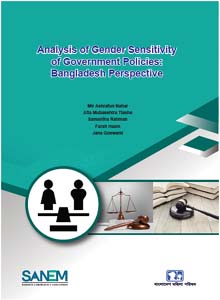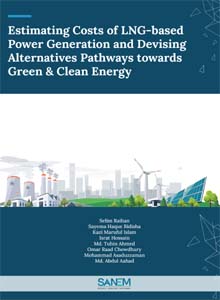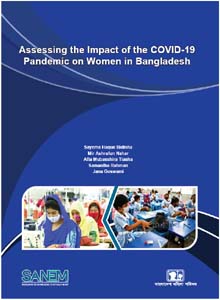
Analysis of Gender Sensitivity of Government Policies: Bangladesh Perspective
 Citation: Nahar, M. A., Tiasha, A. M., Rahman, S., Hasin, F., & Goswami, J. (2023). Analysis of Gender Sensitivity of Government Policies: Bangladesh Perspective. SANEM Publications, Dhaka, Bangladesh.
Citation: Nahar, M. A., Tiasha, A. M., Rahman, S., Hasin, F., & Goswami, J. (2023). Analysis of Gender Sensitivity of Government Policies: Bangladesh Perspective. SANEM Publications, Dhaka, Bangladesh.
Women in Bangladesh frequently struggle for their rights to be upheld in their homes, communities, and governments. In society and the implementation of the law, women continue to face unfairness, marginalization, and prejudice, and they have little say in how decisions are made. Laws and practices that discriminate against women impede formal equality, and sociopolitical conditions prevent women from exercising their rights. In a similar vein, women’s empowerment is essential for the development of a country as well as the survival of society and the family. The purpose of the gender-sensitive policy is to facilitate the growth, development, and empowerment of women. These policies facilitate an increase in women’s participation in decision-making, a necessary condition for sustained socioeconomic growth. The paper tries to identify the sector’s specific gender issues that may require immediate attention from policymakers, to identify the best practices of global experience, particularly in the context of South Asia and East Asia, and to expand the scope of gender-inclusive policy studies, as well as to reveal the implementation drawbacks of responsible ministries in their efforts to close the gender gap. The paper has used the mixed methodological approach using Key Informant Interviews to find primary data and analysis whereas a comprehensive desk research of all relevant policy papers and secondary sources.
The major policy initiatives taken by the government for this purpose are the National Women Development Policy 2011, Gender Policy 2016, Domestic Violence (Prevention and Protection) Act, 2010, Child Marriage Restraint Act, 2017 and National Children Policy 2011. Moreover, there are several rules and regulations under different policies to promote free trade. Through the advancement of women’s rights, empowerment, and a work-friendly atmosphere, the current government is trying to increase the participation of women in the basic structures of the state and society with the help of different ministries. Several initiatives to reduce poverty and introduction of various social protection programs (Food assistance program for destitute mothers, Mother and Child Assistance Program, Child development centre and Teenager’s empowerment program, Micro-credit for Women Self-employment, Welfare Fund for the Oppressed Women and Children and Fund for the Welfare of Burnt and Disabled and many more), increase women’s access to higher education, and inspire women to start their businesses have been launched by the Ministry of Women and Child Affairs. The Law and Justice Division has taken several steps towards creating a more accommodating legal system for women. Moreover, the Ministry of Commerce, Ministry of Disaster Management and Relief and the Ministry for Women’s Advancement and Rights’ Functions and Responsibilities conduct different programs to reinforce the social protection and capability to deal with disasters as well as promote the financial inclusion of women.
Women face severe difficulties and wage disparity is one of the most significant among them. Some other significant issues, including the prevalence of child marriage the resulting rise in the number of women who are victims of domestic violence, and the widespread existence of a patriarchal perspective that prevents women’s empowerment provisions from being put into practice, have been identified. Furthermore, women are often seen as a burden during environmental disasters or climate-related migration. Women business owners have experienced discrimination when applying for loans from banks, limiting their access to financial resources. Due to social norms, women typically have in family and society. No decision-making positions. Henceforth, to make the status of women better off in society, the government and non-governmental organizations (NGOs) can reduce the dropout rate among female students by attempting to group them into a category where they will receive training for various outsourcing positions. Additionally, society’s view of women needs to be changed over time; this can be accomplished by presenting women as role models and highlighting their significant contributions to society. Policies and initiatives related to youth development, such as those related to drug abuse, gender-based violence, and juvenile crime, must be prioritized and specified simultaneously. Providing businesswomen with financial assistance in the form of economic stimulus programmes is also crucial for the protection of women business owners. Women must be able to work without fear of harassment in an office setting that is conducive to their development. On the other hand, banking reform must be implemented by simplifying and eradicating redundant steps in the procedures for SME bank loans. To identify more particular and gender-based difficulties, plausible studies should be undertaken. In order to create effective policies and projects that will remove the barriers that women face and enable them to participate fully in a variety of social, cultural, and political spheres, numerous government agencies and organizations, NGOs, lawmakers, policymakers, and private stakeholders should come together.



